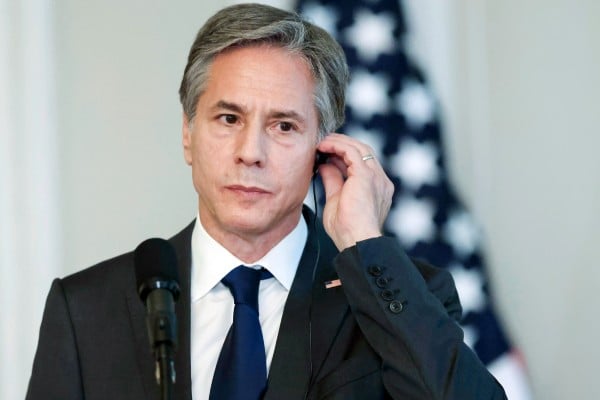The top U.S. diplomat said that for Riyadh, too, progress on the Palestinian issue was necessary for the normalization process to move forward.
By JNS
U.S. Secretary of State Antony Blinken said on Wednesday that a normalization agreement between Israel and Saudi Arabia could not come at the expense of a two-state solution to the Israeli-Palestinian conflict.
Speaking on the “Pod Save the World” podcast, Blinken said, “Normalization—any of the efforts that are going on to improve relations between Israel and its neighbors—are not, cannot be a substitute for Israel and the Palestinians resolving their differences and having a much better future for Palestinians. And in our judgment, of course, that must… needs to involve a two-state solution.”
He went on to say that progress with regard to the Palestinians was important to the Saudis, too.
“It’s also clear from what we hear from the Saudis that if this process is to move forward, the Palestinian piece is going to be very important,” he said.
In response to a question from the show’s hosts as to the advisability of “rewarding” the current leadership of Israel and Saudi Arabia, the top U.S. diplomat emphasized the issue transcended individual leaders and governments.
“If you have the leading Muslim country in the world, Islamic country in the world, making peace with Israel, that’s going to have benefits that travel well beyond the region,” he said.
“This and most things that we do are not about individual leaders or individual governments; they’re about the substance of the issue and whether we can, in whatever we’re doing, advance a world that’s a little bit more peaceful, a little bit more prosperous, a little bit more full of opportunity,” he said. “And there’s no question in my mind that if we could help achieve normalization between Israel and Saudi Arabia, it would move the world in that direction,” he added.
“We’ve had extraordinary turmoil in that part of the world going back to at least 1979—decades of turmoil. Moving away from that, having more moderating and integrating dynamics carry things forward, I think would be a profound change and a profound change for the good—and a change that would, again, not be tied to any specific government but to the fundamental interests of the countries involved,” he said.
Last month, Israeli Foreign Minister Eli Cohen told the Arabic-language Elaph online newspaper that the Palestinian issue would not be an obstacle to normalizing relations with Saudi Arabia.
“The current Israeli government will take steps to improve the Palestinian economy,” he said.
In exchange for supporting a normalization agreement, the Palestinian Authority reportedly wants more control over areas of Judea and Samaria, the reopening of the U.S. consulate in Jerusalem and the resumption of Saudi financial support.
“Senior [P.A. chief Mahmoud] Abbas adviser Hussein al-Sheikh, who is leading the consultations on the issue with Riyadh, gave Saudi National Security Adviser Musaed bin Mohammed al-Aiban the list of possible deliverables three months ago,” Axios reported in August.
Riyadh has already proposed resuming financial assistance to the P.A., according to Saudi officials and former Palestinian officials.
Recently, Riyadh appointed its first-ever non-resident envoy to the P.A., who will double as consul general to Jerusalem.
The list of demands suggests Palestinian leaders are taking a more practical approach to Saudi-Israel normalization than they did in 2020 to the Abraham Accords. It described that deal between Israel, the United Arab Emirates and Bahrain as “a stab in the back of the Palestinian cause and the Palestinian people.”
Netanyahu last month downplayed claims that the Palestinian issue has played a significant role in the Israel-Saudi deal negotiations. “Is that what’s being said in corridors? Is that what’s being said in discreet negotiations? The answer is a lot less than you think,” he said.
Do You Love Israel? Make a Donation - Show Your Support!
Donate to vital charities that help protect Israeli citizens and inspire millions around the world to support Israel too!
Now more than ever, Israel needs your help to fight and win the war -- including on the battlefield of public opinion.
Antisemitism, anti-Israel bias and boycotts are out of control. Israel's enemies are inciting terror and violence against innocent Israelis and Jews around the world. Help us fight back!



